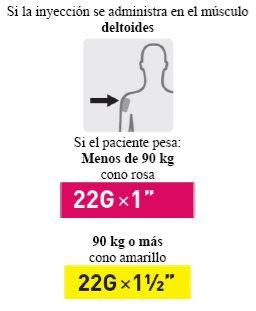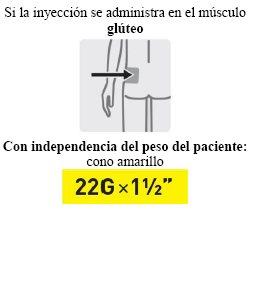
TREVICTA 525 mg PROLONGED-RELEASE INJECTABLE SUSPENSION
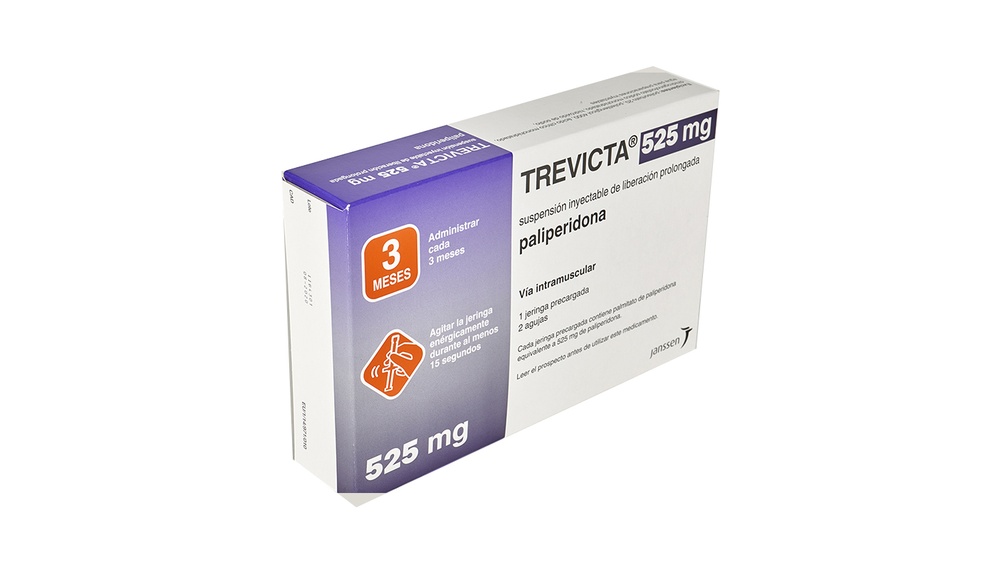

How to use TREVICTA 525 mg PROLONGED-RELEASE INJECTABLE SUSPENSION
Translated with AI
This page provides general information and does not replace a doctor’s consultation. Always consult a doctor before taking any medication. Seek urgent medical care if symptoms are severe.
Show originalContents of the leaflet
- Introduction
- What is TREVICTA and what is it used for
- What you need to know before you use TREVICTA
- How to use TREVICTA
- This medicine is administered by a doctor or healthcare professional. Your doctor will tell you when you should receive the next injection. It is important that you do not miss a scheduled dose. If you cannot attend your appointment with your doctor, make sure to call them immediately to schedule another appointment as soon as possible.
- Possible Adverse Effects
- Storage of TREVICTA
- Keep this medicine out of the sight and reach of children.
- Package Contents and Additional Information
Introduction
Package Leaflet: Information for the User
TREVICTA 175 mg prolonged-release injectable suspension
TREVICTA 263 mg prolonged-release injectable suspension
TREVICTA 350 mg prolonged-release injectable suspension
TREVICTA 525 mg prolonged-release injectable suspension
paliperidone
Read all of this leaflet carefully before you start using this medicine because it contains important information for you.
- Keep this leaflet, you may need to read it again.
- If you have any further questions, ask your doctor, pharmacist, or nurse.
- If you get any side effects, talk to your doctor, pharmacist, or nurse. This includes any possible side effects not listed in this leaflet. See section 4.
Contents of the pack
- What is TREVICTA and what is it used for
- What you need to know before you use TREVICTA
- How to use TREVICTA
- Possible side effects
- Storage of TREVICTA
- Contents of the pack and other information
1. What is TREVICTA and what is it used for
TREVICTA contains the active substance paliperidone, which belongs to a class of medicines called antipsychotics, and is used as maintenance treatment to control the symptoms of schizophrenia in adult patients.
If you have responded well to treatment with paliperidone palmitate injectable suspension given once a month, your doctor may decide to start treatment with TREVICTA.
Schizophrenia is a disorder with "positive" and "negative" symptoms. Positive means an excess of symptoms that are normally not present. For example, a person with schizophrenia may hear voices or see things that do not exist (called hallucinations), have false beliefs (called delusions), or have an abnormal distrust of others. Negative refers to the lack of behaviors or feelings that are normally present. For example, a person with schizophrenia may withdraw into themselves and not respond to any emotional stimulus or may have problems speaking in a clear and logical way. People with this disorder may also feel depressed, anxious, guilty, or tense.
TREVICTA can relieve the symptoms of your illness and reduce the likelihood of them coming back.
2. What you need to know before you use TREVICTA
Do not use TREVICTA
- if you are allergic to paliperidone or any of the other ingredients of this medicine (listed in section 6).
- if you are allergic to other antipsychotic medicines, including risperidone.
Warnings and precautions
Talk to your doctor, pharmacist, or nurse before you start using TREVICTA.
This medicine has not been studied in elderly patients with dementia. However, elderly patients with dementia who are being treated with other similar medicines may have an increased risk of stroke or death (see section 4).
All medicines can cause allergic reactions. Some of the allergic reactions to this medicine may be serious. If you have ever had a serious allergic reaction to any other antipsychotic medicine, tell your doctor before taking this medicine.
TREVICTA may make you more likely to get infections such as pneumonia. Tell your doctor if you have a fever, flu-like symptoms, cough, or difficulty breathing.
TREVICTA may cause high blood sugar. Tell your doctor if you have any of the following symptoms: thirst, hunger, urination, or weakness.
TREVICTA may affect the way your body regulates temperature. Tell your doctor if you feel overheated or overcooled.
TREVICTA may cause a condition called orthostatic hypotension, which can make you feel dizzy or lightheaded when standing up. Tell your doctor if you feel dizzy or lightheaded when standing up.
TREVICTA may cause a condition called tardive dyskinesia, which can cause involuntary movements of the face, tongue, or other parts of the body. Tell your doctor if you have any of the following symptoms: tongue rolling, lip smacking, or other involuntary movements.
TREVICTA may cause a condition called neuroleptic malignant syndrome, which can cause fever, muscle stiffness, and changes in mental status. Tell your doctor if you have any of the following symptoms: fever, muscle stiffness, or changes in mental status.
TREVICTA may cause a decrease in white blood cell count, which can increase the risk of infection. Tell your doctor if you have a fever, flu-like symptoms, or any other signs of infection.
TREVICTA may cause a condition called hyperprolactinemia, which can cause changes in menstrual cycle, breast tenderness, or galactorrhea. Tell your doctor if you have any of the following symptoms: changes in menstrual cycle, breast tenderness, or galactorrhea.
TREVICTA may cause a condition called QT prolongation, which can increase the risk of abnormal heart rhythms. Tell your doctor if you have any of the following symptoms: abnormal heart rhythms, dizziness, or fainting.
Children and adolescents
Do not use this medicine in children and adolescents under 18 years of age. The safety and efficacy of TREVICTA in children and adolescents have not been established.
Other medicines and TREVICTA
Tell your doctor if you are taking, have recently taken, or might take any other medicines.
If you take this medicine with carbamazepine (an antiepileptic and mood stabilizer), you may need to have your dose adjusted.
Because this medicine acts mainly on the brain, the use of other medicines that act on the brain may increase the risk of side effects such as drowsiness or other effects on the brain, such as other psychiatric medicines, opioids, antihistamines, and sleeping medicines.
Because this medicine can lower blood pressure, you should be careful when taking it with other medicines that lower blood pressure.
This medicine may reduce the effect of medicines used to treat Parkinson's disease and restless legs syndrome (e.g., levodopa).
This medicine may cause an abnormality in the electrocardiogram (ECG) that indicates that the electrical impulses are delayed in reaching a specific part of the heart (known as "prolongation of the QT interval"). Among the medicines that have this effect are some medicines used to regulate heart rhythm or treat infections, as well as other antipsychotics.
If you have a history of seizures, this medicine may increase the risk of seizures. Other medicines that have this effect include some medicines used to treat depression or infections, as well as other antipsychotics.
TREVICTA should be used with caution with medicines that increase the activity of the central nervous system (psychostimulants such as methylphenidate).
TREVICTA with alcohol
Alcohol should be avoided.
Pregnancy and breastfeeding
If you are pregnant or breastfeeding, think you may be pregnant, or are planning to have a baby, ask your doctor or pharmacist for advice before taking this medicine. You should not use this medicine during pregnancy unless you have talked to your doctor. In newborns of mothers who have received paliperidone in the last trimester (the last three months of pregnancy), the following symptoms may occur: tremors, stiffness, or weakness, drowsiness, agitation, breathing problems, or difficulty feeding. If your child shows any of these symptoms, seek medical attention for your child.
This medicine can pass from mother to child through breast milk and may harm the child. For this reason, you should not breastfeed while using this medicine.
Driving and using machines
During treatment with this medicine, dizziness, extreme tiredness, and vision problems (see section 4) may occur. These effects should be taken into account when requiring maximum attention, for example when driving vehicles or operating machinery.
TREVICTA contains sodium
This medicine contains less than 1 mmol of sodium (23 mg) per dose, which is essentially "sodium-free".
3. How to use TREVICTA
This medicine is administered by a doctor or healthcare professional. Your doctor will tell you when you should receive the next injection. It is important that you do not miss a scheduled dose. If you cannot attend your appointment with your doctor, make sure to call them immediately to schedule another appointment as soon as possible.
You will be given a TREVICTA injection in the upper arm or buttock once every 3 months.
Depending on your symptoms, your doctor may increase or decrease the amount of medicine you receive at the next scheduled injection.
Patients with kidney problems
If you have mild kidney problems, your doctor will determine the appropriate dose of TREVICTA based on the dose of paliperidone palmitate injectable suspension you have been receiving. If you have moderate or severe kidney problems, you should not use this medicine.
Elderly population
If you have reduced kidney function, your doctor will determine the appropriate dose of this medicine.
If you receive more TREVICTA than you should
This medicine will be administered under medical supervision; therefore, it is unlikely that you will receive more than the prescribed dose.
If a patient receives too much paliperidone, they may experience the following symptoms: drowsiness or sedation, increased heart rate, low blood pressure, changes in the electrocardiogram (ECG), or slow and abnormal movements of the face, body, arms, or legs.
If you stop using TREVICTA
If you stop receiving the injections, your symptoms of schizophrenia may worsen. You should not stop using this medicine unless your doctor tells you to.
If you have any further questions on the use of this product, ask your doctor or pharmacist.
4. Possible Adverse Effects
Like all medicines, this medicine can cause adverse effects, although not all people suffer from them.
Report immediately to your doctor if:
- you have blood clots in the veins, especially in the legs (symptoms are swelling, pain, and redness of the legs), which can reach the lungs through the bloodstream, causing chest pain and difficulty breathing. If you notice any of these symptoms, seek medical advice immediately.
- you have dementia and observe a sudden change in your mental state or sudden weakness or numbness of the face, arms, or legs, especially on one side of the body; or if you have difficulty speaking, even if it's for a short time. It can be a sign of a stroke.
- you have fever, muscle stiffness, sweating, or reduced level of consciousness (a disorder called "Neuroleptic Malignant Syndrome"). You may need immediate medical treatment.
- you are male and have prolonged or painful erections. This is called priapism. You may need immediate medical treatment.
- you have involuntary rhythmic movements of the tongue, mouth, and face. It may be necessary to withdraw paliperidone.
- you suffer a severe allergic reaction characterized by fever, swelling of the mouth, face, lips, or tongue, difficulty breathing, itching, skin rash, and sometimes a drop in blood pressure (which constitutes an "anaphylactic reaction"). Even if you have previously tolerated oral risperidone or oral paliperidone, you may rarely suffer from allergic reactions after receiving paliperidone injections.
- you are scheduled to undergo eye surgery, make sure to tell your ophthalmologist that you are taking this medicine. During eye surgery for cataracts, it is possible that the iris (the colored part of the eye) may become flaccid during surgery (known as "floppy iris syndrome") with consequent eye damage.
- you have a dangerously low number of a type of white blood cells necessary to fight blood infections.
The following adverse effects may appear:
Very common adverse effects: may affect more than 1 in 10 people
- difficulty falling asleep or staying asleep
Common adverse effects: may affect up to 1 in 10 people
- common cold symptoms, urinary tract infection, feeling of having the flu
- TREVICTA may increase the levels of a hormone called "prolactin" that is detected in blood tests (which may cause symptoms or not). When symptoms of increased prolactin appear, they may include (in men) breast swelling, difficulty having or maintaining erections, or other sexual dysfunctions; (in women) breast discomfort, milk secretion from the breasts, loss of menstrual periods, or other problems with the menstrual cycle.
- high blood sugar, weight gain, weight loss, decreased appetite
- irritability, depression, anxiety
- feeling of restlessness
- parkinsonism: This disease may include slow or altered movement, feeling of stiffness or tension in the muscles (making sudden movements) and sometimes a feeling of "freezing" of movement that then restarts. Other signs of parkinsonism include walking slowly, dragging feet, tremors while resting, increased saliva, and/or drooling, and loss of facial expressiveness.
- restlessness, feeling drowsy or less attentive
- distonia: It is a disorder that involves slow or continuous involuntary contraction of the muscles. Although any part of the body can be affected (and can cause abnormal postures), distonia often affects the muscles of the face, including abnormal movements of the eyes, mouth, tongue, or jaw.
- dizziness
- dykinesia: This disorder involves involuntary muscle movements and may include repetitive, spasmodic, or twisting movements, or spasms
- tremors (shakiness)
- headache
- rapid heart rate
- high blood pressure
- cough, nasal congestion
- abdominal pain, vomiting, nausea, constipation, diarrhea, indigestion, toothache
- increased concentration of liver transaminases in the blood
- bone or muscle pain, back pain, joint pain
- loss of menstrual periods, milk secretion from the breasts
- fever, weakness, fatigue (tiredness)
- reactions at the injection site, with itching, pain, or swelling.
Uncommon adverse effects: may affect up to 1 in 100 patients
- pneumonia, chest infection (bronchitis), respiratory tract infection, sinusitis, bladder infection, ear infection, tonsillitis, fungal infection of the nails, skin infections
- reduction in the number of white blood cells, decrease in a type of white blood cells in the blood that help fight infections, reduction in platelets (cells necessary to stop bleeding), anemia
- allergic reaction
- diabetes or worsening of diabetes, increased blood insulin concentration (hormone that regulates blood sugar levels)
- increased appetite
- loss of appetite resulting in malnutrition and weight loss
- high triglycerides in the blood, high cholesterol in the blood
- sleep disorders, euphoria (mania), decreased sexual desire, nervousness, nightmares
- late dykinesia (spasms or uncontrolled spasmodic movements of the face, tongue, or other parts of the body). Report to your doctor immediately if you experience involuntary rhythmic movements of the tongue, mouth, or face. It may be necessary to withdraw this medicine.
- fainting, overwhelming urge to move certain parts of the body, dizziness when standing up, attention problems, speech disorders, loss or alteration of taste, decreased skin sensitivity to pain and touch, feeling of tingling, pinching, or numbness of the skin
- blurred vision, eye infection, or red eyes, dry eyes
- feeling that everything is spinning (vertigo), ringing in the ears, ear pain
- disruption of conduction between the upper and lower parts of the heart, cardiac conduction disorders, prolongation of the QT interval of the heart, accelerated heart rate when standing up, slowed heart rate, anomalies in the heart's electrical recording (electrocardiogram or ECG), feeling of palpitations or fluttering in the chest (palpitations)
- low blood pressure, low blood pressure when standing up (due to this effect, some people treated with this medicine may feel weakness or dizziness, or may faint when getting up or sitting down suddenly)
- difficulty breathing, respiratory tract congestion, wheezing, sore throat, nasal bleeding
- abdominal discomfort, gastric or intestinal infection, difficulty swallowing, dry mouth, excessive gas or flatulence
- increased GGT (a liver enzyme called gamma-glutamyltransferase) in the blood, increased liver enzymes in the blood
- appearance of hives (or urticaria), itching, rash, hair loss, eczema, dry skin, redness of the skin, acne
- increased CPK (creatine phosphokinase) in the blood, an enzyme that is sometimes released with muscle breakdown
- muscle spasms, joint stiffness, muscle weakness, neck pain
- urinary incontinence, frequent urination, pain when urinating
- erectile dysfunction, ejaculation disorders, loss of menstrual periods or alterations in the cycle (in women), breast development in men, sexual dysfunction, breast pain
- swelling of the face, mouth, eyes, or lips, swelling of the body, arms, or legs
- increased body temperature
- changes in gait
- chest pain or discomfort, feeling of general malaise
- skin hardening
- falls.
Rare adverse effects: may affect up to 1 in 1,000 patients
- eye infection
- skin inflammation caused by mites, abscess under the skin
- increase in eosinophils (a type of white blood cell) in the blood
- inappropriate secretion of a hormone that controls urine volume
- presence of sugar in the urine
- complications of uncontrolled diabetes with life-threatening risks
- low blood sugar
- excessive water intake
- confusion
- lack of movement or response while being awake (catatonia)
- sleepwalking
- absence of emotions
- inability to reach orgasm
- neuroleptic malignant syndrome (confusion, decreased or lost consciousness, high fever, and severe muscle stiffness), problems in the blood vessels of the brain, including sudden loss of blood flow to the brain (stroke or "mini" stroke), unresponsiveness to stimuli, loss of consciousness, decreased level of consciousness, seizures (epileptic crises), balance disorder
- abnormal coordination
- glaucoma (increased internal eye pressure)
- eye movement disorders, "glassy eyes", hypersensitivity of the eyes to light, increased tearing, redness of the eyes
- atrial fibrillation (a heart rhythm disorder), irregular heartbeats
- blood clots in the veins, especially in the legs (symptoms include swelling, pain, and redness of the leg). If you experience any of these symptoms, seek medical help immediately.
- flushing
- difficulty breathing during sleep (sleep apnea)
- pulmonary congestion
- crackling sounds in the lungs
- pancreatitis, tongue swelling, fecal incontinence, passing very hard stools
- chapped lips
- drug-related skin rash, skin thickening, dandruff
- joint swelling
- inability to urinate
- breast discomfort, breast swelling, breast enlargement
- vaginal discharge
- very low body temperature, chills, feeling of thirst
- withdrawal symptoms from the medicine
- pus accumulation due to infection at the injection site, infection of the deep layers of the skin, cyst at the injection site, hematoma (bruising) at the injection site.
Frequency not known: cannot be estimated from the available data
- dangerously low number of a type of white blood cells in the blood necessary to fight infections
- severe allergic reaction characterized by fever, swelling of the mouth, face, lips, or tongue, difficulty breathing, itching, skin rash, and sometimes a drop in blood pressure
- excessive and dangerous water intake
- sleep-related eating disorder
- diabetic coma
- head shaking
- blood clots in the lungs causing chest pain and difficulty breathing. If you experience any of these symptoms, seek medical help immediately.
- shallow and agitated breathing, pneumonia caused by aspiration of food, voice disorders
- decrease in oxygen in parts of the body (due to decreased blood flow)
- intestinal obstruction, lack of intestinal movement that causes an intestinal obstruction
- yellowing of the skin and eyes (jaundice)
- severe allergic reaction with swelling that can affect the throat and cause difficulty breathing
- skin discoloration, peeling, itching of the scalp or skin
- abnormal posture
- newborns whose mother has taken TREVICTA during pregnancy may experience adverse effects from the medicine and/or withdrawal symptoms, such as irritability, slow or sustained muscle contractions, tremors, insomnia, respiratory or feeding problems
- priapism (a prolonged erection that may require surgical treatment)
- decreased body temperature
- accumulation of dead cells in the skin surrounding the injection site, ulcer at the injection site.
Reporting of side effects
If you experience any kind of adverse effect, consult your doctor, pharmacist, or nurse, even if it is a possible side effect that does not appear in this leaflet. You can also report them directly through the national reporting system included in Appendix V. By reporting side effects, you can contribute to providing more information on the safety of this medicine.
5. Storage of TREVICTA
Keep this medicine out of the sight and reach of children.
Do not use this medicine after the expiration date that appears on the packaging. The expiration date is the last day of the month indicated.
This medicine does not require special storage conditions.
Medicines should not be disposed of via wastewater or household waste. Ask your pharmacist how to dispose of the packaging and any unused medicines. This will help protect the environment.
6. Package Contents and Additional Information
TREVICTA Composition
The active ingredient is paliperidone.
Each TREVICTA 175 mg pre-filled syringe contains 273 mg of paliperidone palmitate.
Each TREVICTA 263 mg pre-filled syringe contains 410 mg of paliperidone palmitate.
Each TREVICTA 350 mg pre-filled syringe contains 546 mg of paliperidone palmitate.
Each TREVICTA 525 mg pre-filled syringe contains 819 mg of paliperidone palmitate.
The other components are:
Polysorbate 20
Polyethylene glycol 4000
Citric acid monohydrate
Sodium dihydrogen phosphate monohydrate
Sodium hydroxide (for pH adjustment)
Water for injectable preparations
Product Appearance and Package Contents
TREVICTA is a long-acting injectable suspension, white to off-white in color, presented in a pre-filled syringe that the doctor or nurse will shake vigorously to homogenize the suspension before injecting it.
Each package contains 1 pre-filled syringe and 2 needles.
Only some package sizes may be marketed.
Marketing Authorization Holder
Janssen-Cilag International NV
Turnhoutseweg 30
B-2340 Beerse
Belgium
Manufacturer
Janssen Pharmaceutica NV
Turnhoutseweg 30
B-2340 Beerse
Belgium
You can request more information about this medicine by contacting the local representative of the marketing authorization holder.
België/Belgique/Belgien Janssen-Cilag NV Tel/Tél: +32 14 64 94 11 | Lietuva UAB “JOHNSON & JOHNSON” Tel: +370 5 278 68 88 |
България ”Джонсън & Джонсън” ЕООД Тел.: +359 2 489 94 00 | Luxembourg/Luxemburg Janssen-Cilag NV Tél/Tel: +32 14 64 94 11 |
Ceská republika Janssen-Cilag s.r.o. Tel:+420 227 012 227 | Magyarország Janssen-Cilag Kft. Tel.:+36 1 884 2858 |
Danmark Janssen-Cilag A/S Tlf: +45 45 94 82 82 | Malta AM MANGION LTD. Tel: +356 2397 6000 |
Deutschland Janssen-Cilag GmbH Tel: +49 2137-955-955 | Nederland Janssen-Cilag B.V. Tel: +31 76 711 1111 |
Eesti UAB “JOHNSON & JOHNSON” Eesti filiaal Tel.: +372 617 7410 | Norge Janssen-Cilag AS Tlf: +47 24 12 65 00 |
Ελλάδα Janssen-Cilag Φαρμακευτικη Α.Ε.Β.Ε Tηλ: +30 210 80 90 000 | Österreich Janssen-Cilag Pharma GmbH Tel: +43 1 610 300 |
España Janssen-Cilag, S.A. Tel: +34 91 722 81 00 | Polska Janssen-Cilag Polska Sp. z o.o. Tel.: +48 22 237 60 00 |
France Janssen-Cilag Tel: 0 800 25 50 75 / +33 1 55 00 40 03 | Portugal Janssen-Cilag Farmacêutica, Lda. Tel: +351 214 368 600 |
Hrvatska Johnson & Johnson S.E. d.o.o. Tel: +385 1 6610 700 | România Johnson & Johnson România SRL Tel: +40 21 207 1800 |
Ireland Janssen Sciences Ireland UC Tel: +353 1 800 709 122 | Slovenija Johnson & Johnson d.o.o. Tel: +386 1 401 18 00 |
Ísland Janssen-Cilag AB C/o Vistor hf Sími: +354 535 7000 | Slovenská republika Johnson & Johnson s.r.o. Tel: +421 232 408 400 |
Italia Janssen-Cilag SpA Tel: +39 02 2510 1 | Suomi/Finland Janssen-Cilag Oy Puh/Tel: +358 207 531 300 |
Κύπρος Βαρνάβας Χατζηπαναγής Λτδ Tηλ: +357 22 207 700 | Sverige Janssen-Cilag AB Tel: +46 8 626 50 00 |
Latvija UAB “JOHNSON & JOHNSON” filiale Latvija Tel: +371 6789 3561 | United Kingdom Janssen-Cilag Ltd. Tel: +44 1 494 567 444 |
Date of Last Revision of this Leaflet:
Detailed information on this medicine is available on the European Medicines Agency website: http://www.ema.europa.eu/.
Information Reserved for Healthcare Professionals
This information is intended solely for healthcare professionals, who should read it in conjunction with the complete prescribing information (Summary of Product Characteristics).
| Administer every 3 months |
| Shake the syringe vigorously for at least 15 seconds |
For Intramuscular Injection Only. Do Notadminister by any other route.
Important
Read the complete instructions before using the product. To ensure proper administration of TREVICTA, it is necessary to carefully read these instructions for use.
TREVICTA must be administered by a healthcare professional as a single injection. DO NOTdivide the dose into repeated injections.
TREVICTA is indicated for intramuscular administration only. Inject slowly and deeply into the muscle, avoiding injection into a blood vessel.
Dosage
TREVICTA will be administered once every 3 months.
Preparation
Remove the label from the syringe and attach it to the patient's medical record.
TREVICTA requires more vigorous and prolonged shakingthan the monthly paliperidone palmitate injectable. Shake the syringe vigorously, with the end facing upwards, for at least 15 seconds in the 5-minute interval preceding administration(see step 2).
Selection of the Thin-Wall Safety Needle
Thin-wall safety needles are designed for use with TREVICTA. It is essential to use only the needles provided in the TREVICTA package.
Package Contents per Dose
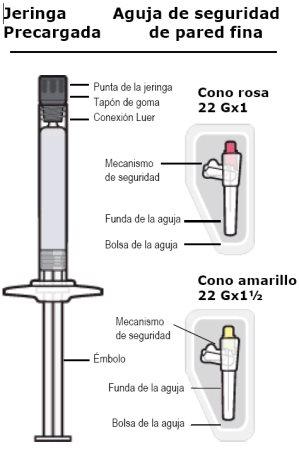

The selection of the needle is determined by the injection site and the patient's weight.
|
|


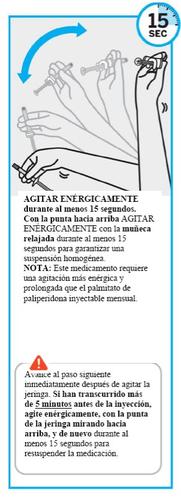
Check the Suspension
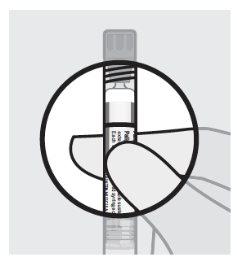
After shaking the syringe for at least 15 seconds, check the appearance of the suspension in the viewing window.
The suspension should have a uniform appearance and a milky white color.
It is normal for small air bubbles to appear.
Open the Needle Blister Pack and Remove the Cap.
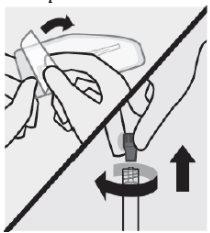
First, open the needle blister pack by peeling back the cover to the middle. Place it on a clean surface.
Then, with the syringe facing upwards, twist the rubber cap to remove it.
Hold the Needle Blister Pack.
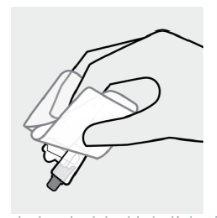
Bend the foil that covers the needle and the plastic tray backwards. Then, firmly grasp the needle sheath, holding it by the blister pack as indicated.
Attach the Needle
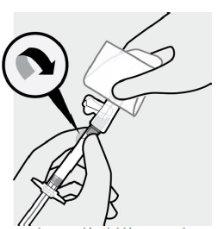
With the other hand, hold the syringe by the luer connection and attach the safety needle with a gentle clockwise rotation.
Do not removethe blister pack until the syringe and needle are perfectly engaged.
Remove the Needle Cap
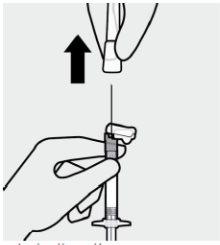
Remove the needle cap by pulling it straight off.
Do nottwist the cap, as this could loosen the needle from the syringe.
Eliminate Air Bubbles
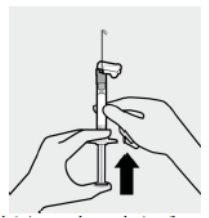
Tap the syringe gently, with the tip facing upwards, to make any air bubbles rise.
Slowly and carefully, press the plunger upwards to expel the air.

Inject the Dose
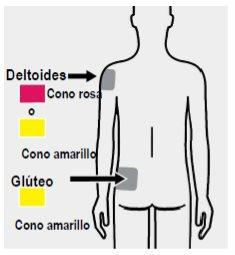
Slowly inject the entire contents of the syringeintramuscularly, deeply into the deltoid or gluteus.
Do not administer by any other route.

Protect the Needle
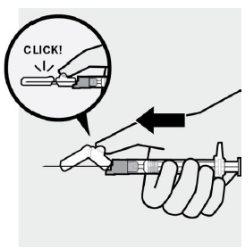
After injection, use your thumb or a flat surface to activate the needle safety mechanism. The needle will be secure when you hear a “click”.
Proper Disposal
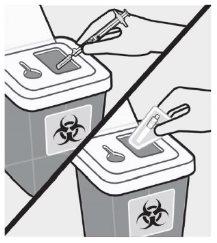
Dispose of the unused syringe and needle in an approved container for sharp objects.

- Country of registration
- Average pharmacy price819.16 EUR
- Active substance
- Prescription requiredYes
- Manufacturer
- This information is for reference only and does not constitute medical advice. Always consult a doctor before taking any medication. Oladoctor is not responsible for medical decisions based on this content.
- Alternatives to TREVICTA 525 mg PROLONGED-RELEASE INJECTABLE SUSPENSIONDosage form: INJECTABLE, 150 mg + 100 mgActive substance: paliperidoneManufacturer: Teva Pharma S.L.U.Prescription requiredDosage form: INJECTABLE, 50 mgActive substance: paliperidoneManufacturer: Teva Pharma S.L.U.Prescription requiredDosage form: INJECTABLE, 1000 mgActive substance: paliperidoneManufacturer: Janssen-Cilag International N.VPrescription required
Online doctors for TREVICTA 525 mg PROLONGED-RELEASE INJECTABLE SUSPENSION
Discuss questions about TREVICTA 525 mg PROLONGED-RELEASE INJECTABLE SUSPENSION, including use, safety considerations and prescription review, subject to medical assessment and local regulations.
Frequently Asked Questions







